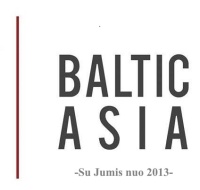
Ambassador Choi Sung-Joo, currently residing in Warsaw, is already the 13th Republic of Korea’s Ambassador to Lithuania. The letters of credence to President Dalia Grybauskaitė was handed over by him on January 16, 2016.
South Korean Ambassador came to Lithuania once more on March 6 – 7. During the visit, the Ambassador gave the lecture called “Lithuania, South Korea and the world” at the halls of Centre for Asian Studies at VMU and Asian Centre at MRU. The audience was introduced to current cooperation news between South Korea and Lithuania, a South Korean image in a global context and to insights on what kind of diplomatic measures should their country take to avoid military threats from North Korea.
South Korean and Lithuanian cooperation: the numbers are steadily growing
Among Asian countries South Korea is the second largest trade partner of Lithuania (after China). In the following table, which shows statistical data of South Korean export and import to and from Lithuania, one can see a steady growth of at least several tens millions of U.S. dollar a year. Statistically, Lithuanian‘s entrepreneurs engaged in production associated with artificial filament yarn, wheat, wood, cheese, precious metals or metal scrap, so far show the greatest potential for export to Korea. In the meantime, electronics, information technology, automobile parts and their production are imported to Lithuania.
| 2012 | 2013 | 2014 | 2015 | |
| Export | 122 mln. | 146 mln. | 216 mln. | 264 mln. |
| Import | 32 mln. | 41 mln. | 51 mln. | 73 mln. |
* South Korea’s trade volumes with Lithuania; amounts are in U.S. dollars.
In terms of investment, Korean investment in Lithuanian market reached 3,34 million U.S. dollars (about 3,15 million euros), while Lithuanian investment in Korea – 145 thousand U.S. dollars (about 136 thousand euros) according to 2015 data.
Furthermore, service providers, that belong to the tourism sector, especially those who work with incoming tourism, should be wide-awake for growing numbers of Korean people visiting Vilnius, Riga and Tallinn as the Baltic region is getting a lot of attention for its distinctive attractiveness and undiscovered sites. According to 2016 data, a total number of 55 thousand Koreans have already visited Lithuania and 2,200 Lithuanians have been to South Korea. Better youth itinerancy from both of countries could be encouraged with more bilateral exchange or other educational programs, as there is still room to improve, even though currently 48 Lithuanian students are studying in South Korea and 130 students from Korea are studying in Lithuania.

In the face of South Korea – a mix of joy and anxiety
Since Korea does not have an abundance of natural resources, the 15 million people state’s economy is totally dependent on export and its investments are mainly focused on heavy and chemical industries. Time has shown that the decision to invest in these industries, especially in navigation, automobile production, development of memory chips was right. The shortage of natural resources in the past and present also lead to focus enormously on human resources: “We decided that our another important investment is our children’s education. Korean parents are working really hard and they sacrifice themselves in order for their children to have best education possible”.
Choi Sung-Joo noted that Korea’s GDP is in the 13th position in the global context. In fact, we could only be amazed and learn, how Korea managed to raise their GDP from 80 U.S. dollars in 1960 to 28000 U.S. dollars today.
According to smartphone usage, Korea ranks first in the world.
Also, Korean Ambassador tried to explain the sensational growth pace by exceptional characteristics of Korean people – a strong tendency to constantly compete with others and an implacable habit to always rushing while doing every single task until the time of retirement. Choi Sung-Joo also said that “ in the past people valued speed more than quality, but today people are trying to get the job done faster and better”. While visiting or living in Korea often times you can hear the phrase “pali-pali” (빨리빨리) which in Korean means “hurry up” (because of this, Koreans are sometimes called pali-pali-culture).
Another very important cultural and economic factor is the ability of successfully exporting your popular culture. According to the Ambassador „South Korea is a unique example showing how after World War II a recipient country transformed into a donor country. Nowadays, a lot of attention is dedicated to cultural diplomacy, especially K-pop (Korean pop music culture) and K-food (Korean food)“.

While speaking about Korean and Lithuanian similarities, the country‘s representative could not omit an alarming topic about North Korea: “today 193 sovereign states belongs to the United Nations, but among them, Korea is the only one divided into two nations. Unfortunately“. According to the Ambassador this disturbing factor is the essential similarity between Korea and Lithuania, i.e. the situation of geopolitical security: “Only your threats of security come from the East, ours – from the North“. Another similarity is that both countries in the past have experienced painful foreign military invasions – such things leave their own traces for future generations. Finally, “the security of both countries depends on the United States of America, only in the case of Lithuania USA works through NATO and of Korea – through Korea-USA alliance, which was concluded by signing a mutual agreement of defense in 1953.
When asked what both countries should do in order to strengthen the close relationship in the future, Ambassador basically pointed out three elements: P2P (peer-to-peer/people-to-people) exchange, increasing and strengthening contacts between students, better mutual understanding of cultures (the different religions as well as different „European“ and „Asian“ world outlooks).
